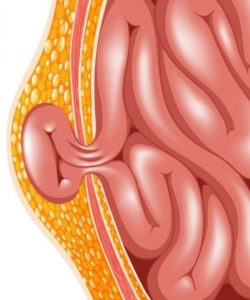Need a hernia repair? Have It Your Way!
The staff at DeKalb Surgical Associates (DSA) want to wish you a very Happy New Year, and best wishes for a healthy and prosperous future.
The start of the new year often comes with resolutions to do something new or different, or to get something done that should have been done long ago. When it comes to your health, resolutions to do something that should have been done in the past will pay dividends down the road. Perhaps you have a hernia you’ve known about for a while or perhaps you think you might have a hernia based on symptoms such as pain in the groin or around the belly button, with a bulge that you can see or feel. Maybe a good resolution would be to get this looked at in 2024.

You might think that hernias are always repaired the same way, but that is not the case. It’s analogous to how one might choose different recipes for a particular entree. The final dish can be delicious even though prepared differently, depending on the chef’s experience and preferences, and the ingredients you start with.
Before we had the options of laparoscopic or robotic repair, all hernias were repaired through a surgical incision right over the hernia. This is now called the “open” technique. It still is appropriate in many cases. But now we also have the options of laparoscopic or robotic repair. Both of these newer techniques involve the use of gaining access into the abdominal cavity through very small incisions and repairing the hernia “from the inside out”.
In most cases, mesh is used as a primary component of the repair. And although we are quite comfortable with using this in virtually every case, there are some patients who would prefer that no mesh be used. And this is certainly an option when using the “open” technique. Laparoscopic and robotic techniques in most cases will provide a repair with less postoperative pain. On the other hand, the “open” technique can be done without requiring general anesthesia, or the use of a tube in your airway during the surgery.
Jehovah’s Witnesses are very sensitive to what surgical techniques are used, giving priority to one that has the lowest risk for any blood loss, given their refusal to accept blood transfusions in any case. The “open” technique may be the best choice for those patients, and DeKalb Surgical Associates has become a “go to” practice for many of these patients.
So the bottom line is, if you are thinking of having a hernia repaired this coming year, let us know what your priorities are, and we will make sure you “have it your way”!
